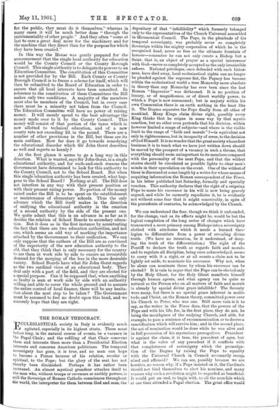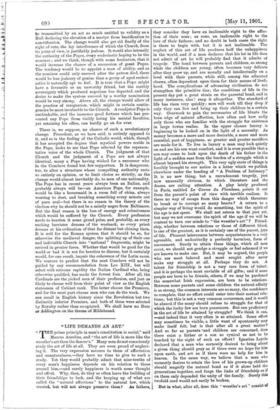THE ROMAN THEOCRACY. E CCLESIASTICAL society in Italy is evidently much
agitated, especially in its highest strata. There must before long, in the natural course of events, be a vacancy in the Papal Chair; and the refilling of that Chair concerns them and interests them more than a Presidential Election interests and concerns American politicians. The temporal sovereignty has gone, it is true, and no man can hope to become a Prince because of his relation, secular or spiritual, to the Pope; but the glory of the seat has not thereby been diminished. Perhaps it has rather been increased. An almost mystical grandeur attaches itself to the man who, without troops or revenues or earthly powers, is still the Sovereign of Roman Catholic consciences throughout the world, the interpreter for them between God and man, the depositary of that "infallibility" which formerly belonged only to the representatives of the Church Universal assembled in (Ecumenical Council. The Pope, in the plenitude of his temporal sovereignty, was probably never so completely Sovereign within the mighty corporation of which he is the recognised head, never so free as the ultimate fountain of honour—remember be can not only create a Bishop but a Saint, that is, an object of prayer as a special intercessor with God—never so completely accepted as the only irresistible referee. National privileges, once defended with such bitter= ness, have died away, local ecclesiastical rights can no longer be pleaded against the supreme fiat, the Papacy has become within the ecclesiastical world a true Monarchy more absolute in theory than any Monarchy has ever been since the last Roman " Imperator " was dethroned. It is no position of luxury, or of magnificence, or of direct worldly power, to which a Pope is now summoned; but in majesty within his own Communion there is on earth nothing in the least like it. The Dogma separates the Pope finally from all other of mankind. Many Kings claim divine right, possibly every King thinks that he reigns in some way by that mystic sanction, but no other even pretends that his decision, within however limited a range of subjects—and where is the visible limit to the range of "faith and morals" ?—is equivalent not only in righteousness, but in incapacity of error, to the decision of God Himself. It is no wonder that the great society whose first business it is to teach what we have just written down should be moved by the prospect of a vacancy in such a throne, that everything should seem unimportant to its members compared with the personality of the next Pope, and that the wildest stories should be circulated as possible lights to clear men's minds in their speculation on the event. One of the wildest of these is discussed at some length by a writer for whose means of acquiring information the Roman correspondent of the Times, in his letter published last Saturday, formally and specially vouches. This authority declares that the right of a reigning Pope to name his successor in his will is now being gravely argued, and while he earnestly repudiates it, he is evidently not without some fear that it might conceivably, in spite of the precedents of centuries, be acknowledged by the Church.
We can understand the fear, though we think it unfounded, for the change, vast as its effects might be, would be but the logical completion of the long series of changes which have transmuted a mere primacy among Bishops into a sovereignty clothed with attributes which it needs a learned theo- logian to differentiate from a power of revealing divine truth. (We have no intention, be it understood, of deny- ing the truth of the differentiation.) The right of the Pontiff to declare the truth as regards faith and morals, and to regulate all discipline, being once acknowledged, seems to carry with it a right, or at all events a claim not to be lightly set aside, to nominate his successor. Why not, when he alone can nominate those by whom his successor can be elected ? It is vain to argue that the Pope can be elected only by the Holy Ghost, for the Holy Ghost manifests himself through human agents, and what agency can be quite so natural as the Person who on all matters of faith and morals is already by special divine grace infallible P The Seventy were many, but there is no special grace inherent in multi- tude, and Christ, on the Roman theory, committed power over his Church to Peter, who was one. Still more vain is it to say, as the writer in the Times does, that the powers of the Pope end with his life, for, in the first place, they do not, he being the mouthpiece of the undying Church, and able, for example, to pass a sentence of excommunication or to decree a sanctification which will survive him; and in the second place, the act of nomination would be done while he was alive and in full possession of his mysterious prerogatives. Precedent is against the claim, it is true, the precedent of ages, but what is the value of any precedent if it conflicts with that completeness of sovereignty which the promulga- tion of the Dogma by raising the Pope to equality with the Universal Church in Council necessarily recog.. nised and affirmed? We can see, possibly because we are heretics, no reason why, if a Pope insisted on it, the Cardinals should not bind themselves to elect his nominee, and many reasons why such a revolution might be regarded as beneficial. It would put an end, to begin with, to all the scandals which at one time attended a Papal election. The great office would be transmitted by an act as much entitled to validity as a Bull declaring the elevation of a martyr from beatification to sanctification. The change would also get rid finally of the right of veto, the lay interference of which the Church, from its point of view, is justifiably jealous. It would also intensify the authority of the Popes, every ecclesiastic hoping to be the nominee ; and we think, though with some hesitation, that it would increase the chance of a succession of great Popes. The tendency would be to appoint a man of ability, and as the nominee could only succeed after the patron died, there would be less jealousy of genius than a group of aged ecclesi- astics is naturally apt to feel. It is true that a Pope might have a favourite or an unworthy friend, but the earthly sovereignty which produced nepotism has departed, and the desire to make the system succeed by a worthy nomination would be very strong. Above all, the change would allow of the practice of resignation, which might in certain contin- gencies be most invaluable to the Church. A coadjutor Pope is unthinkable, and the immense good fortune which has pre- vented any Pope from visibly losing his mental faculties, yet retaining his office, can hardly go on for ever.
There is, we suppose, no chance of such a revolutionary change. Precedent, as we have said, is entirely opposed to it, and so is the feeling of the Catholic world, which, though it has accepted the dogma that mystical powers reside in the Pope, looks to see that Pope selected by the represen- tative voice of the whole Church. The judgment of that Church and the judgment of a Pope are not always identical, many a Pope having wished for a successor who in the Conclave found but few supporters. It is dangerous, too, to alter a structure whose compelling authority rests so entirely on opinion, or to limit choice so strictly, as the change would almost inevitably do, to men of one nationality. The Pope has in recent years always been an Italian, and probably always will be—an American Pope, for example, would be like a housemaid in a room full of china, always wanting to dust, and breaking something every minute out of pure zeal—but there is no reason in the theory of the election why he should not be a saintly negro from Baltimore. But the final reason is the loss of energy and cohesiveness which would be suffered by the Church. Every profession needs to hearten it some grand prize, and probably, as every sucking barrister dreams of the woolsack, so every priest dreams at his ordination of that far distant but shining tiara. It is well for the Roman system that it should be so, for otherwise the mediteval danger, the splitting up of their one and indivisible Church into " national " fragments, might be revived in greater force. Whether that would be good for the world or bad it is not for heretics to discuss, but it certainly would, for one result, impair the coherence of the Latin races. We venture to predict that the next Conclave will not be guided by any recommendation from Leo XIII., but will select with extreme rapidity the Italian Cardinal who, being otherwise qualified, has made the fewest foes. After all, the Cardinals are the picked men of their profession, and just as likely to choose well from their point of view as the English statesmen of Cabinet rank. The latter choose the Premiers, and for the most part choose men who can do the work. We can recall in English history since the Revolution but two distinctly inferior Premiers, and both of them were selected by Royalty rather than co-optated. We shall have no Bute or Addington on the throne of Hildebrand.







































 Previous page
Previous page